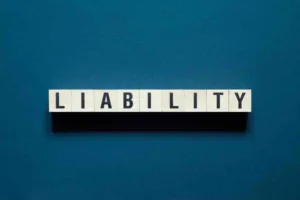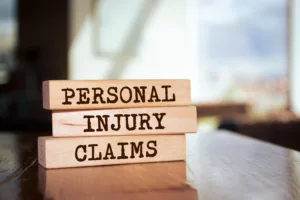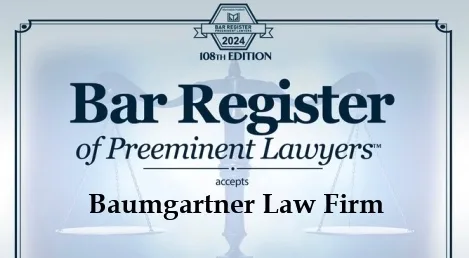
Liability in a personal injury case means being legally responsible for damages determined by law or a court lawsuit. The person or parties determined to be liable must compensate the victim for the injuries proven in the case.
Baumgartner Law Firm is a Houston personal injury law firm helping injured victims since 1985.
Understanding Liability for Personal Injury in Texas

In legal terms, liability refers to responsibility for an act or omission that causes harm or damage. In Texas, liability laws are mainly controlled by the Texas Civil Practice and Remedies Code. This code sets out the rules and steps for civil lawsuits in the state.
One key aspect of liability in Texas is the concept of negligence. Negligence occurs when a person fails to exercise reasonable care and harms another person. In a liability case, the person suing must show that the other person did something wrong and that it caused harm.
Texas follows a modified comparative negligence system. Comparative responsibility allows a plaintiff to get compensation even if they are partly to blame, as long as their share of fault is under 51%. However, the amount of damages they can recover is reduced by their percentage of fault.
Here are some key points to remember about liability in Texas:
- Liability is determined by negligence.
- Texas follows a modified comparative negligence system.
- The plaintiff must prove that the defendant’s negligence caused the harm or damage.
- The damages a plaintiff can recover are reduced by their percentage of fault if they are partially at fault.
The Texas Civil Practice and Remedies Code
The Texas Civil Practice and Remedies Code is the primary legal document for Texas civil liability. It outlines the rules and procedures for civil lawsuits, including liability-related ones. This code is crucial for understanding how Texas liability is determined and applied and how damages are recoverable.
The code covers a wide range of topics, from general provisions to specific rules for different types of liability. It also includes provisions on damages, the statute of limitations, and other important aspects of liability law.
Understanding this code is essential for anyone dealing with liability issues in Texas. It provides the legal framework for determining responsibility and compensation in liability cases.
Negligence and Comparative Negligence in Texas
Negligence is a key concept in Texas liability laws. It means not being careful enough in a situation where a reasonable person would be careful. When negligence leads to harm, the negligent party may be held liable.
In Texas, the concept of comparative negligence applies. Comparative responsibility means that the fault is divided among all parties involved in an incident. Each party’s level of responsibility is determined, and they are held liable accordingly.
Here are some key points about comparative negligence in Texas:
- If a party is more than 50% at fault, they cannot recover damages.
- If a party is less than 50% at fault, they can recover damages, but their percentage of fault reduces the amount.
Understanding these concepts is crucial in liability cases. They play a significant role in determining who is liable and how much they owe in damages.
Proving Liability in a Personal Injury Lawsuit in Texas
Proving liability in a personal injury case requires demonstrating negligence which requires the following elements:
Duty of Care
The defendant owed a duty of care to the plaintiff, meaning they had a legal obligation to act reasonably to prevent foreseeable harm.
Breach of Duty
The defendant breached this duty through their actions or inaction, failing to meet the standard of care expected in the given circumstances.
Causation
There must be a direct link, or proximate cause, between the defendant’s breach of duty and the plaintiff’s injuries or damages.
Damages
Finally, the plaintiff must have suffered damages which is actual harm or losses due to the defendant’s actions.
Proportionate Responsibility and Damages in Texas
In Texas, the concept of proportionate responsibility is applied in liability cases. This means that each party’s liability is proportionate to their degree of fault.
For instance, if a party is found to be 30% at fault, they would be responsible for 30% of the damages. This approach ensures that the burden of damages is shared fairly among all parties involved which is also known as contributory fault.
Likewise, if the plaintiff is partly at fault for an accident, in Texas, their damages will be reduced accordingly. However, if a plaintiff is 51% or more at fault for an accident, they will be barred from collecting compensation.
Understanding proportionate responsibility is crucial when dealing with liability cases in Texas. It helps parties understand their potential liability and prepare accordingly.
Joint and Several Liability in Texas
Joint and several liability is a legal principle that can be applied in Texas liability cases. This principle comes into play when multiple parties are found to be at fault for an injury or damage.
Under Texas law, a defendant can be held 100% responsible for paying damages if found to be more than 50% at fault. This is regardless of the degree of fault of other parties involved in the incident.
- However, if a defendant is found to be 50% or less at fault, they are only responsible for an equivalent percentage of the damages. This is known as proportionate responsibility. It’s a key aspect of joint and several liability in Texas.
What Types of Damages Can You Get in an Accident Case?
When you file a personal injury lawsuit, the person who was negligent and caused your injuries could be responsible for economic and non-economic damages.
Most personal injury lawsuits include these types of damages:
- medical bills and expenses
- lost wages or reduced earning capacity
- loss of enjoyment of life
- pain and suffering
- mental anguish or emotional distress
- physical impairment
- punitive or exemplary damages with exceptionally willful or dangerous acts
How much your personal injury case is worth depends upon how badly you have been injured, how strong your liability evidence is, and the available insurance coverage to pay your damages.
The Role of Insurance in Collecting Damages
Insurance plays a crucial role in managing liability claims in Texas. It protects individuals and businesses financially if they are liable for damages. The amount of insurance can impact the money available to pay damages after a personal injury claim is made.
If the person who caused an accident has limited insurance, the victim may only receive a limited amount of compensation. It can be hard to collect damages in Texas if the wrongdoer has no insurance or only a small amount of insurance. Insurance is always a factor in how much a case is worth.
Who Pays Damages for Liability in Texas?
Most personal injury lawsuits or claims in Texas are paid by insurance coverage. Some injury claims the insurance company will try to settle fairly and some not. It is very difficult in Texas to collect damages without insurance coverage. Liability insurance often covers a personal injury claim.
If you get hurt in a car crash, you might buy liability insurance in case you have another accident. In Texas, you must have car insurance to get your vehicle licensed or inspected. It is required by law.
However, Texas’s minimum required automobile insurance coverage is only $30,000 in bodily injury per person, totaling $60,000 per accident. If someone with the least amount of insurance hurts you, the most their insurance will pay is $30,000 per person and $60,000 total for the whole accident. If you have underinsured motorist coverage, your auto policy can stack onto the other driver’s insurance to pay for damages.
In Texas, commercial vehicle accidents require higher liability insurance coverage to pay damages in a personal injury accident. Higher insurance limits are required for 18-wheelers and other commercial vehicles under applicable Texas and federal rules.
Many other types of liability coverage may apply to your personal injury claim. For example, homeowners’ insurance may cover personal injury claims against homeowners for injuries on their property. At the same time, professional liability coverage may cover doctors and other professionals who may have been negligent and caused damages.
Most personal injury cases in Houston, TX, are settled at some point before a trial. To get the settlement money, the injured person must give up their right to sue the person who caused the harm. Always seek counsel from a reputable Houston personal injury attorney before you consider settling any personal injury claim.
The Importance of Understanding Texas Liability Laws
Knowing Texas liability laws is important for those hurt in an accident and looking to get compensation for their injuries. Talking with a personal injury lawyer near me is recommended when making an injury claim.
Contact our Houston Personal Injury Law Firm for a Free Case Evaluation
If another person has injured you, you may be entitled to compensation for your damages. Contact our personal injury law firm at (281) 587-1111 and take advantage of our free consultation offer to discuss your case with the pre-eminent rated attorney. All cases we accept are handled on a contingency fee basis, meaning we only get paid if we get you money.
6711 Cypress Creek Pkwy, Houston, TX, 77069
About Our Law Firm
Baumgartner Law Firm is a top-rated Houston personal injury law firm headed by Greg Baumgartner.

Our personal injury law firm was established in 1985 and has helped thousands of injury victims get maximum compensation for their cases. If you have been injured in an accident in Houston, TX, contact us for a free, no-obligation consultation. (281) 587-1111.
Since 1985, Baumgartner Law Firm has limited our law practice to serious personal injury cases. Our legal team has won maximum compensation for thousands of accident victims and recovered millions of dollars for real people like you.
Read some of our 5-star reviews!
Helping these areas around Houston
Houston, Sugar Land, Conroe, The Woodlands, Cypress, Spring, Humble, Katy, Atascocita, Kingwood and Tomball.

